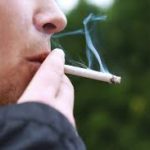
For this reason, the identification of smoking on a patient’s history is very important. It is often one of the first things that I look for on the intake medical history after allergies and medications. Whether the amount of tobacco use listed is accurate is up for debate. I figure most patients put down what they would like it to be, not necessarily how much tobacco they are exposed to every day. I strongly urge patients that they must refrain from all tobacco use at least three to four weeks before and after surgery. Some plastic surgeons refuse to operate at all on smoking patients for certain procedures such as a tummy tuck. I even know some that get a nicotine level several days before surgery. I don’t go quite that far but I can understand this concern. No plastic surgeon wants to deal with avoidable complications. On the surface, no patient wants to either but the addiction of smoking is quite strong even in the face of making smart decisions when you are venturing thousands of dollars in an investment in your body.
There is little question that smoking affects wound healing. I have seen a disproportionate number of patients who said they stopped smoking, but when they developed wound problems such as a dehiscence (separation of the incision line), they casually admitted that they had not stopped completely or had slipped in a few in the past few days to ‘calm them down’. Although I have no scientific evidence to support it, my feeling is that the effects of smoking probably takes many months (not just 3 or 4 weeks) and even up to a year after quitting to become ‘normal’ from a wound healing standpoint.
A recent journal article in Plastic and Reconstructive Surgery (May 2008) now implicates smoking as a cause of increased infections as well. I must say I am not surprised.
Dr. Barry Eppley
Indianapolis, Indiana


